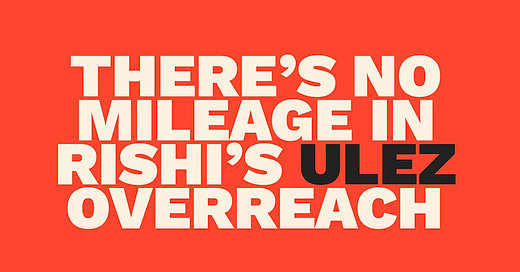There's no mileage in Sunak's ULEZ overreach
By-election trouble shows the Tories Net Zero gamble isn't paying off, but Labour could still feel the head over the true cost of its ambitions in government
The double by-election car crash overnight for the government has added further evidence to the fact that Rishi Sunak’s Net Zero roll-back shows no real political mileage for the Tories ahead of the next general election.
Despite attempts to extend the culture wars to Low Traffic Neighbourhoods, cars, speed limits, heat pumps, meat taxes and bins at Tory Party Conference, in the cold light of day, the Conservatives got “overly excited” about its ULEZ-bashing campaign during the Uxbridge by-election in July, and is misreading public opinion on the politics of the climate emergency.
This is the argument laid out in our latest episode, where Sam and Ayesha were joined by former Clinton White House advisor Paul Bledsoe, the former HM Treasury advisor who worked Rishi Sunak Tim Leunig and The Telegraph’s Environmental Editor Emma Gatten, to discuss the politics of Net Zero.
“Sunak and his strategists have decided to really lean into this kind of culture war - particularly around the motorist - hailing the PM is going to be the person to end it. They have looked at Uxbridge and think there’s a clear dividing line where they can be more popular than Labour. But they have massively overinterpreted what happened in Uxbridge and have just got very over excited about winning a seat, that Labour had never won ever, by 500 votes.” Hosts Ayesha Hazarika and Sam Freedman
“Sunak genuinely thinks the Net Zero agenda has been pushed too far by his processor, and what he saw as the gesture politics of Boris Johnson - deciding he wants to push back on that and make a thing of being more long term about it. But the result in Uxbridge came at a particular moment when the ULEZ charge was about to come in and a lot of people thought they might have to pay it when they didn’t have to pay it. ULEZ is also an air pollution issue not a Net Zero one.” Sam Freedman
But, there are still big questions when it comes to Labour’s ambitions and how the party can deliver on them in government.
“Some Labour people do sense they are ahead on green issues, but at the back of their mind there’s a fear about how ordinary people feel about the question of who pays.” Ayesha Hazarika
“Net Zero is expensive. There are lots of estimates flying around, one is that we would need to be spending something like at least £50bn a year to get there - and we’re not spending anywhere near that kind of amount at the moment. So this ambition has been set, and set for a while, with some plans, including those watered down a little bit by Rishi Sunak, but we don’t really have a fully worked out plan to get us to Net Zero by 2050 and we haven’t really explored how much that is going to cost.” Sam Freedman
Bledsoe in particular encouraged Labour to continue to be “smart” and lean into the economic benefits and arguments associated with Net Zero. He pointed in particular to the Biden administration’s Inflation Reduction Act, which is already driving record levels of private investment behind the agenda, and warned that providing incentives to consumers and business rather than taxes was the right way forward, arguing that the “average family does not want climate action to be carried on the backs of working class families”. Labour also has the opportunity he said to “reestablish British leadership on the international stage” and the chance to be part of leading the world economy when it comes to clean energy.
“If Labour win, there will be a meaty challenge to achieve the goals they are setting out. Investing a lot of money will be key - but is £20bn really enough to do everything they are promising and sell some pretty tricky stuff to the public as it gets closer and more real? Clearly you can also see the party has been speaking to the Americans - with both the Democrats and Labour trying to make a conscious decision to go big and radical on this agenda but be economically minded to not scare the horses too much - making it about jobs and bills coming down.” Hosts Ayesha Hazarika and Sam Freedman
The guests all agreed that Labour was playing the politics of Net Zero about right - stating that it “will be hard and require tough choices” but that the party had “done enough to show the British people that it was important to them and why”. The details however will be in the delivery - with civil servants likely to be key in turning the rhetoric into a workable plan.
What do you think?
We’ll be back next week looking at tactical voting and cross party working in government - assessing the evidence from the by-elections, polling data, and how Labour approached these issues in the run up to 1997.
In the meantime, you can contact The Power Test on pod@thepowertest.co.uk or message us on X (if we’re calling it that yet) @thepowertest.
Why not get involved in the conversation?





